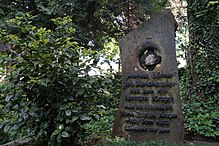Hermann Pörzgen
Hermann Pörzgen also: Poerzgen (born May 7, 1905 in Kiel ; died December 3, 1976 in Moscow ) was a German journalist .
Life
Hermann Pörzgen studied theater studies and philology in Hamburg , Riga , Berlin and Cologne from 1924 and received his doctorate in 1936 . From 1929 he was an employee and from 1934 foreign policy editor of the Frankfurter Zeitung , which first sent him to Prague and Warsaw . On December 1, 1938, he joined the NSDAP . From 1937 to 1941 Pörzgen was the foreign correspondent for the Frankfurter Zeitung in Moscow, where he was also a representative of the DNB for a time , and after the outbreak of war in 1941 he was interned with the German embassy staff and then exchanged. In March 1942 he was accepted into the foreign service of the Greater German Reich and was employed at the Consulate General in Tangier . He also reported from Spanish Morocco for the weekly newspaper Das Reich and did not fail to promote anti-Semitism among readers with racist undertones . In June 1944 he became deputy press officer in occupied France in Vichy and moved to Sofia as a press attaché , where he was taken prisoner by the Soviets. Pörzgen's reports from the Soviet Union in the 1930s, and even private trips to the Leningrad Hermitage, were interpreted as espionage. The examining magistrates noted that he had "written articles of a defamatory character" - his "anti-Soviet" stance was evident. Pörzgen was sentenced to 15 years in prison; His appeals for clemency were also unsuccessful.
He did not return to Germany until 1955 with the last prisoners of war. He resumed his journalistic work, wrote a report for the Frankfurter Allgemeine Zeitung about his visit to the Auschwitz concentration camp and called on the West German judiciary to prosecute concentration camp doctor Carl Clauberg more vigorously . In 1956 he returned to Moscow as a correspondent for the FAZ. A series of books about the Soviet Union emerged from his correspondent reports for readers in the Federal Republic.
Pörzgen's Russian report A country without God from 1936 was placed on the list of literature to be sorted out in the Soviet occupation zone in 1946 . As early as 1936, Theodor Balk stated in a review in the émigré magazine Die Neue Weltbühne about the "cleverly made book": "Mr. Poerzgen, you lied."
In 1965, Pörzgen was awarded the Federal Cross of Merit, 1st Class, and in 1972 the Theodor Wolff Prize .

Pörzgen was first married to the author Gisela Döhrn, who wrote reports from the Soviet Union and Morocco at his side during the Nazi era and who, after the divorce from Pörzgen in the Federal Republic, worked under the pseudonym Gisela Bonn at the side of Giselher Wirsing made a second career as a publicist. The daughters Maria Theresia Pörzgen and Gemma Pörzgen (* 1962) come from Pörzgen's second marriage to Marie Theresia Körner .
Fonts
- 100 times a hundred times the Soviet Union. Piper, Munich 1972.
- Reported from Moscow. Frankfurter Allgemeine, Frankfurt a. M. 1969.
- Russia under hammer and sickle. Bertelsmann, Gütersloh 1967.
- The Soviet compass rose. Rheinische Verlags-Anstalt, Wiesbaden 1964.
- That's how you live in Moscow. List, Munich 1958.
- A country without God. Impressions from a trip to Russia. Societäts-Verlag, Frankfurt a. M. 1936.
- Theater as a branch of arms. The German front theater in World War 1914–1920. Societäts-Verlag, Frankfurt a. M. 1935. (Dissertation Cologne 1935)
- Theater without a woman. Ost-Europa-Verlag, Koenigsberg 1933
literature
- Maria Keipert (Red.): Biographical Handbook of the German Foreign Service 1871–1945. Published by the Foreign Office, Historical Service. Volume 3: Gerhard Keiper, Martin Kröger: L – R. Schöningh, Paderborn et al. 2008, ISBN 978-3-506-71842-6 .
Web links
- Literature by and about Hermann Pörzgen in the catalog of the German National Library
- Hermann Pörzgen , Internationales Biographisches Archiv 21/1977 from May 16, 1977, in the Munzinger archive ( beginning of article freely accessible)
Individual evidence
- ↑ Hans Dieter Müller: High above grave and grief and death and torment. "Das Reich" - portrait of a German weekly newspaper. In: Der Spiegel. 34/1964.
- ^ Andreas Eichmüller: No general amnesty - the criminal prosecution of Nazi crimes in the early Federal Republic. Oldenbourg, Munich 2012, ISBN 978-3-486-70412-9 , pp. 139ff
- ^ German administration for popular education in the Soviet occupation zone, list of the literature to be sorted out Berlin: Zentralverlag, 1946. # 8977
- ^ Theodor Balk: Poerzgen on the Volga. In: The new world stage. No. 29, July 16, 1936, pp. 902-904, here: p. 904
- ↑ Gemma Pörzgen at DNB
| personal data | |
|---|---|
| SURNAME | Pörzgen, Hermann |
| ALTERNATIVE NAMES | Poerzgen, Hermann |
| BRIEF DESCRIPTION | German journalist |
| DATE OF BIRTH | May 7, 1905 |
| PLACE OF BIRTH | Kiel |
| DATE OF DEATH | 3rd December 1976 |
| Place of death | Moscow |